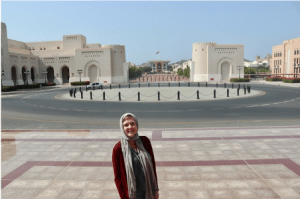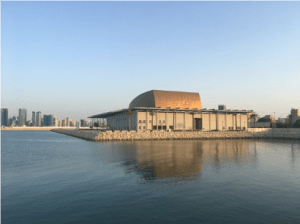The Arabian Peninsula is typically not a top-tier destination for young, solo female travelers. But for the Hunt Institute’s Kelsey Shipman (SMU ‘20), spending part of her summer in several countries on the Peninsula provided unparalleled research opportunities.
Kelsey is a Richter Undergraduate Research Fellow at SMU, which allowed her to follow her research as it took her halfway

around the globe. Dividing her time between Muscat, Oman and Manama, Bahrain, she explored the intersection between female participation in the labor force and economic growth in those countries.
“One of the reasons why I chose these two countries in particular is they have released ‘grand policy plans,’” Shipman said. “Increasing female labor force participation is a huge part of those economic visions, and I was curious to see if we saw any change in female labor force participation in these two states with the introduction of these policies.”
According to The World Bank, only 19.9% of females in Bahrain and 12.7% of females in Oman were participating in their country’s labor force in 2019. In contrast, both countries also fall within the top quartile of Gross National Income per capita in the world based on World Bank data from 2018.
“My goal is to investigate how we might be able to improve female labor force participation,” Shipman said. “And maybe isolate some of the factors that are contributing the most to this continuous low rate.”
Her trip to Bahrain and Oman was only the first phase of Shipman’s research project. The second phase, which is still ongoing, consists of analysis and drawing conclusions from the data she gathered over the summer. Shipman plans to return to both countries over spring break to meet with individuals who could provide guidance for this phase of her project.

“I’ll be meeting with specific individuals who were not there over the summer,” Shipman said. “And meeting again with some of the people who I did have the chance to meet with, to talk through where I am in the project and get their feedback, given the information that I was able to find during my prior trip.”
As her project begins to wrap up, Shipman hopes to complete a final analysis by the time she walks at May graduation. Her report could provide valuable feedback to the governments of Bahrain and Oman on how they could continue to prioritize female labor participation.
“In my final product, I will be providing recommendations as to where the states could go from here, if female labor force participation is something they wish to prioritize as they have stated in these economic visions” Shipman said. “Policy analysis will be an important part of my final report. Even though these policies have not been in place for decades, I hope to see if we have noticed any distinct changes [in female labor force participation] since the policies’ introductions, and those kinds of conclusions will all be represented in this paper.”
Shipman says her experience in Bahrain and Oman helped her grow as a researcher by providing her with many opportunities to share her discoveries and conclusions with people who were completely unfamiliar with her work.
“Doing this independent project really strengthened my ability to articulate my project to individuals who might not be in academia whatsoever,” she said. “Even articulating the project to people who might not have any idea what the labor force participation rate is, or articulating it in a different language, and things like that. I think that that is something that will be continuously valuable for me throughout my career. I plan to pursue a PhD in Economics, and I know that the opportunity to pursue independent economics research abroad will prove to be valuable preparation for my future graduate studies.”
You can read more about Kelsey’s work at the Hunt Institute by clicking here.

